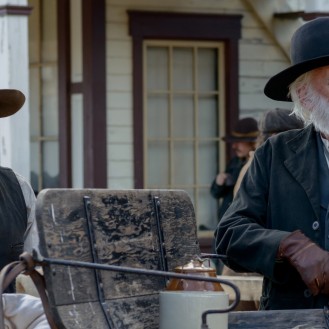In between takes on the set of David Fincher’s Gone Girl, Tyler Perry must’ve thought about making a crime drama or an erotic thriller; and he must’ve thought about merging those ideas into one project. But like most pipe dreams, these visions are usually filed away into our subconscious. But for Perry, A Fall from Grace must’ve been itching to get out.
I’m making these assumptions because (a.) it’s more fun than trying to remember Tyler Perry’s movie and (b.) it’s the only way to thread any sort of reasoning behind this balderdash. The quality of Perry’s work has always been questionable, but each movie has had a purpose behind it. A Fall from Grace has been released shortly after Tyler Perry Studios revealed their state-of-the-art facilities in Southwest Atlanta, and it feels like this film’s purpose is to show off these new resources. As a filmmaker, it must be exciting to have so many properties available. But as a storyteller, Perry is going to have to invest more thought towards these locations. The geography of these settings occasionally makes no sense, such as a main apartment that seems to be missing a kitchen and a bathroom.
This careless detail is one of many that reveals the slapdash nature of A Fall from Grace, Tyler Perry’s first foray with Netflix. The thriller, which centres around a murder trial and is told mostly through flashbacks, is driven by the director’s indifference. Many errors, ranging from Perry’s sloppy shooting style to the over-the-top performances by the cast, could’ve been tightened or tweaked either on-set or in post-production. But A Fall from Grace is yet another project that enables the filmmaker’s obsession with streamlining stories. When Tyler Perry pushes himself and rushes through his process, he isn’t giving himself enough time to follow through with his characters; especially when he’s writing very emotional content. He also isn’t being fair to his actors, who all have the potential to be great.
It’s possible to make movies under unusual circumstances, but those projects have leaders who can prioritize. Tyler Perry isn’t one of these leaders – not yet, at least. He’s someone who benefits from practice; this comes as no surprise considering he’s experienced in rehearsed theatre. Perry has been directing movies since 2006 and although his competence as a filmmaker is arguable, I’ve seen growth. If he wants to challenge himself with risks, he needs to set his own reasonable parameters. If he wants to be an inspirational boss, he has to act like one.
**********
Do You Tweet? Follow These Tweeple:
Addison Wylie: @AddisonWylie




Leave a comment